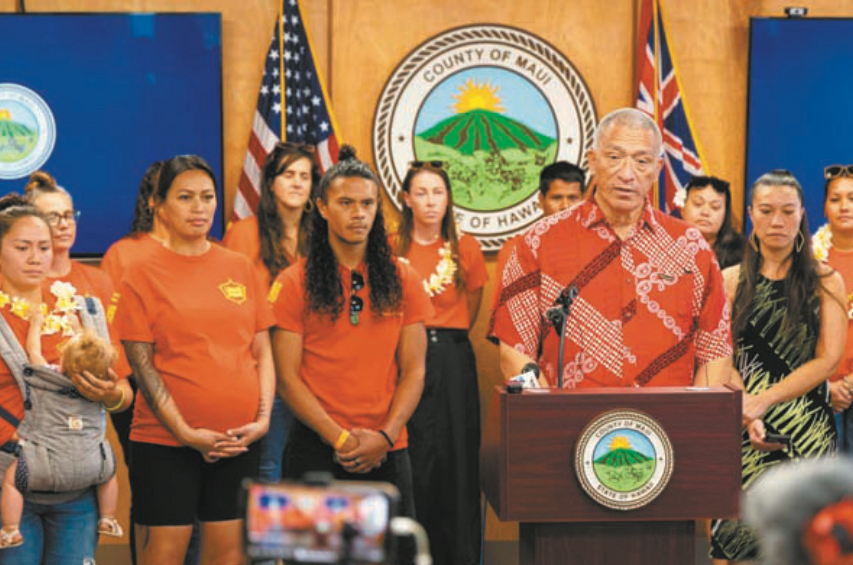By Brandon Maka’awa’awa, Vice President and Minister of Housing, Nation of Hawai‘i
As Vice President and Minister of Housing for the Nation of Hawai‘i, I stand in resolute support of Maui County’s Bill 9, which proposes to phase out approximately 6,127 short-term rentals (STRs) on the Minatoya List by July 1, 2028. This policy is not merely about housing—it is a critical step toward restoring the foundation for Native Hawaiian self-determination. For our people to reclaim our national sovereignty, we must first secure stable homes on our ancestral ʻāina. Without addressing the housing crisis that scatters our lāhui, our aspirations for independence remain unattainable.
The Nation of Hawai‘i, guided by U.S. Public Law 103-150—the 1993 Apology Resolution acknowledging the illegal overthrow of our Kingdom—envisions a sovereign nation rooted in our ahupua‘a system of communal land stewardship. Yet, as Minister of Housing, I witness a harsh reality: our people cannot organize for sovereignty when they are in constant flux, displaced by unaffordable housing costs. U.S. Census data reveals a devastating truth: more Native Hawaiians now live outside Hawai‘i than in our homeland, driven away by a housing crisis fueled by STRs [U.S. Census Bureau, 2020]. This exodus threatens our cultural survival and political aspirations, making housing justice an urgent priority.
The August 8, 2023, Maui fires, which displaced over 12,000 Lāhainā residents, exposed the severity of this crisis. The Minatoya List, comprising 8,834 properties—94% owned by non-residents—represents housing that could shelter our families. As Jordan Ruidas of Lāhainā Strong emphasizes, converting these STRs to long-term rentals offers immediate relief, unlike new construction, which faces delays. The University of Hawai‘i Economic Research Organization (UHERO) projects that phasing out STRs could increase long-term housing by 13% and reduce condo prices by 20-40%, making homes more attainable for Native Hawaiian families [Kaheāwai Media, 2025].
Water, a sacred public trust resource under Hawai‘i’s Constitution, is also at stake. STRs, concentrated in West Maui’s water management area since 2023, consume significantly more water than resident homes due to frequent turnovers, lush landscaping, and pools. Pā‘ele Kiakona of Lāhainā Strong notes that phasing out STRs could conserve water, enabling projects like Pulelehua, an affordable housing development for fire survivors, currently stalled due to unavailable permits. Lucienne De Naie and Jonathan Scheuer argue that reallocating water to public trust uses aligns with our cultural stewardship of ʻāina, a core principle of the Nation of Hawai‘i’s vision [Kaheāwai Media, 2025].
Economically, STRs deepen inequality, with 54% of Maui’s STRs controlled by hosts owning over 20 listings, extracting wealth from our islands. Opponents, like the Realtors Association of Maui, frame STRs as a property right, but courts have ruled that phaseouts are not illegal “takings.” For Native Hawaiians, land is not a commodity—it is our identity and connection to our ancestors. Stacey Alapa‘i, a returning Hawaiian, underscores that housing stability, not speculative equity, preserves our communities. Autumn Ness of the Lahaina Community Land Trust offers a model we support: capping home appreciation to ensure affordability for future generations, echoing our ahupua‘a principles [Kaheāwai Media, 2025].
The housing crisis forces our people into overcrowded homes, couch-surfing, or homelessness—conditions Veronica Mendoza of Roots Reborn calls a “dead end” for marginalized communities. Native Hawaiians, just 10% of Hawai‘i’s population, comprise 28% of its homeless population, a direct legacy of the 1893 overthrow [Hawai‘i Homelessness Report, 2024]. My work with the Nation of Hawai‘i is grounded in a fundamental truth: food, clothing, and shelter are our people’s immediate priorities. Without these, we cannot organize, educate, or mobilize for sovereignty.
Bill 9 is a step toward justice, but more is needed. As Minister of Housing, I advocate for complementary policies—empty home taxes, rent caps, and community land trusts—to ensure affordability for Native Hawaiian and low-income families. The Nation of Hawai‘i envisions a future where our people live in stable, culturally grounded communities, free to pursue self-governance without displacement. Our ahupua‘a system prioritized collective care over individual gain, and Bill 9 aligns with this vision, challenging the colonial narrative that profit trumps people.
Call to Action: Tomorrow, June 9, 2025, the Maui County Council will hear testimony on Bill 9. I urge every reader—Native Hawaiian, kama‘āina, and ally—to submit testimony in support of this bill to county.clerk@mauicounty.us and HLU.committee@mauicounty.us by 10:00 AM. Your voice can help secure housing for our people, a critical step toward sovereignty. Share your stories of displacement, your hopes for our keiki and mo‘opuna, and your commitment to our ʻāina.
Additionally, I call on the Council to pass Bill 9 and adopt policies like deed restrictions to ensure affordability, with the Nation of Hawai‘i ready to partner in building a just housing system.
To Maui County Council, I echo our kupuna: our sovereignty begins with our right to remain on our ʻāina. Pass Bill 9, honor our public trust doctrine, and build a Maui where our lāhui thrives. As Vice President, I pledge the Nation of Hawai‘i’s commitment to a future where our people are housed, empowered, and free.
Mahalo nui for standing with our lāhui.
Brandon Maka’awa’awa
Vice President and Minister of Housing, Nation of Hawai‘i


0 Comments on "Bill 9: A Step Toward Housing Justice and Hawaiian Sovereignty"